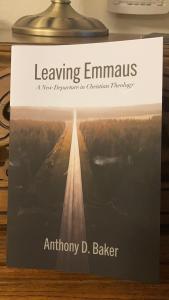
This fall Baylor University Press was generous enough to publish my third book, one I call Leaving Emmaus: A New Departure in Christian Theology. Today’s column will give a little introduction to the book for those afflicted—as I am—with too many things to read. I’ll stick with interpreting the title in this 800 word post. Then you can decide whether that makes you want to read the book, or glad you haven’t bothered.
A New Departure?
That subtitle gave me—and the colleagues and friends I bothered about it—some trouble. I initially wanted to call it “an introduction to theology.” But as a blind reviewer pointed out, if a professor or teacher picked it up thinking it was the one book they could hand to students to introduce all the main themes and vocabulary, they would be disappointed. I spend a good bit of time trying to reorient the discipline of theology as a whole. That might be a little disorienting as the sole guide for the new student.
I still think my book teaches a trustworthy way to begin in theology. But you might consider using it alongside one that says, “OK, this what hypostasis means, and here are some current issues and debates in theology.”
So I settled on “a new departure” as a way to capture my aim for beginnings as well as to announce the reorienting that I was aiming for. What is that reorienting?
The Passion of Theology
To put it in a word, passion. Now, I’m fully aware that “passion” is a complex word in theology. It migrates into contemporary English from the Latin term that says almost the opposite of what we mean by it now. The Greek word dunamis comes closer to it: an energy or power that is kinetically perched to burst into action. But the English word passion gets close enough, I think.
I wanted to write a short systematic theology. I wanted, that is, to lay out the language of Christian faith as an organic connected “system.” And I wanted to build that connection around what seems to me to be the key idea of the New Testament. Faith in Jesus of Nazareth generates passion. Think of the jumping and shouting of the man so recently afflicted with lame legs. Or the extravagant sharing of wealth of those afflicted with stinginess. Meeting Jesus changes people.
This passion is the connection to the Diagonal Way that I’m writing about in this column and other places. We do not name God as God is. We name the God we encounter and trust that our human words can be caught up in God’s passion for self-revealing. Our response to that encounter can–I hope and trust– become a slanting upward toward true knowledge of God.
Theology in Cursive
With that in mind, I set out to connect to key doctrines of Christian faith—who is Jesus, how is God three and one, what does it mean to speak of the end of the world— to that energy. “Christianity is inseparably an art of knowing and an art of living.” That’s the way contemporary theologian and philosopher Jean-Yves Lacoste puts it. My book is about the knowing, but the knowing that connects seamlessly to the living. I don’t offer practical advice on how to pray or organize an outreach ministry. I do try to describe what prayer is, and what the word “church” means. That effort will, I hope, remind us why learning to pray and to create a sustainable outreach ministry is at the heart of the faith.
None of this is to say that a theologian has to be a person of faith. The old adage of Evagrius, that the theologian is the one who prays and the one who prays is a theologian, is mostly true, I think. I also believe that it’s possible to be a perfectly decent theologian hypothetically. A person could, in other words, write theology as if she believed it and prayed it. She could think the thoughts even if the reality of her faith were less explicit.
I am not that kind of theologian, but am rather the praying and believing sort. I actually believe in creation-out-of-nothing and the fall and redemption and the Three-Person God and all that craziness. The life I write about is a life I attempt to live. But I also respect and learn from those who think about the faith they cannot or do not entirely believe in.
Leaving Emmaus
The main title attempts to get at that connection of thought and life, or what Thomas Aquinas calls the “what” and the “that” of faith. “Leaving Emmaus” is my attempt to focus on the part of the story in Luke 24 after the two otherwise unknown disciples have met Jesus. They leave home. They return to Jerusalem in order to gather with the other followers and process together the meaning of their encounters. What they’re doing at this point is putting their experience into words. Their testimony of encounter becomes—slowly and thoughtfully—a shared theological language.
Systematic theology is, as I put it in an early chapter, our collective contemplations of God written in cursive. It attempts, that is, to trace and connect the concepts and big ideas of the Christian language. Meanwhile, the entire language is itself organically connected to the life–the encounter–in which these ideas first take form.
In Leaving Emmaus, then, I try to write theology in cursive, in conversation with as many others as I can manage. And in doing so, I attempt to put into words the passion that an encounter with the risen Jesus generates. So it’s systematic. But diagonal.










